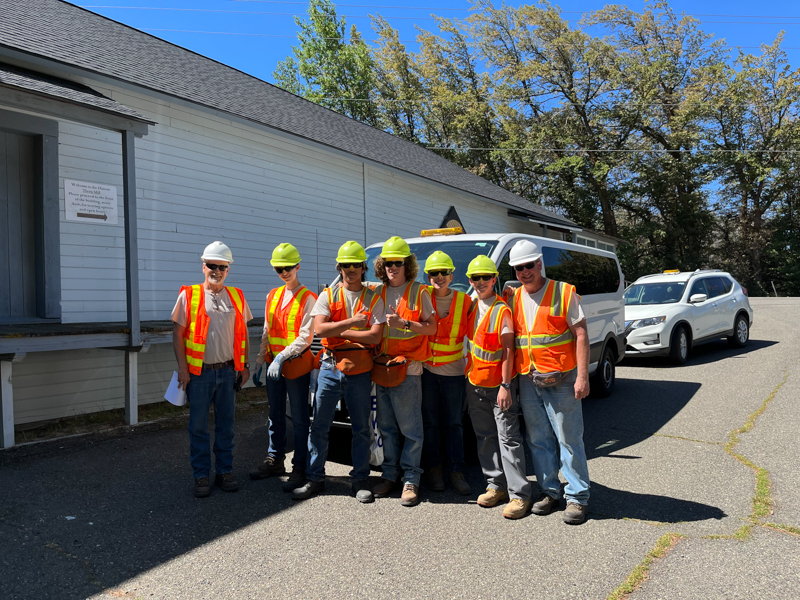
The Ellensburg crew posing for a photo during their lunch break. Rod, the Youth Corps program manager, is on the far left, and Mike, the Ellensburg crew supervisor, is on the far right.
The increasing pace of our high-tech world allows less and less time for teens to have summer jobs, much less to perform public service. This year, 72 Central Washington teens are doing both and making a difference one piece of litter at a time. As members of the Ecology Youth Corps, the students spend their summer break cleaning trash from state highways.
Active since 1975, the program was once the largest and longest-standing youth employment program in the nation. Central Washington’s six crews are based in Ellensburg, Richland, Sunnyside, Toppenish, Goldendale, and Yakima.
On average, Youth Corps crews annually help pick up over one million pounds of litter and clean over 4,000 miles of roads statewide. Nearly 100,000 pounds of that litter is recycled each year.
The program is about more than just trash, though.
“We’re teaching them how to be,” said Rod Hankinson, who has managed Central Washington’s Youth Corps program for nearly 40 years. “They’re finding their way in the world. They’re learning hard work, and they’re learning about the environment.”
If you’ve driven along I-90 near Ellensburg in the last few weeks, you might have seen our Ellensburg crew hard at work. Let’s get to know them and what they’ve accomplished in the past few weeks!
Meet the crew
Mike and the crew bag up trash along I-90 before breaking for lunch
Mike is a local middle school teacher who’s supervised Youth Corps crews in Ellensburg every summer for the last 11 years. He says he loves getting outdoors and working with students outside the classroom.
“They’re fun, they’re funny, they have camaraderie, and they’re learning different skills on the job,” he said.
Mike is out picking up litter alongside the crew all day, and he says he doesn’t ask them to do anything he wouldn’t do. When it’s hot, he takes them to get milkshakes. And as an educator, he’s constantly teaching his crew, whether about how to be safe on the road or how their work fits into a broader vision of environmental protection.
Each crew member has different reasons for joining. Some said it gives them routine and something to do over the summer. Some said it’s great work experience. They all said they love working for Mike. “I’d recommend waiting for a better boss next year,” one crew member joked.
One of the best parts for the crew is bringing home paychecks. Each teen earns $15.74 an hour, a rare opportunity for 14- to 17-year-olds. Many of them have big plans for the over $1000 they’ll make this summer, including saving up, buying a mountain bike, and visiting a friend across the country.
They work hard to earn it, too. The crew leaves at 7 a.m. and does their job even in miserable weather. They have rotating responsibilities, like placing cones around the van, setting up signs, or weighing and counting bags.
One person’s trash is another’s treasure
One crew member's bingo card
To keep morale high, Mike plays litter bingo with the crew. The game is a good incentive, because whenever someone wins, he awards them prize money from his own paycheck.
“If it’s ever been manufactured, we’ve found it on the side of the road,” he said.
Almost everything they find is theirs to keep, including dollar bills. One crew member found a set of pliers that his mom now uses. Another brought home a roll of veterinary wrap for her family’s horses and has begun a scientific collection of animal bones she’s found while working.
The crew said they quickly learned how much trash is out there on our roads.
“That’s our impact as humans, and most of us don’t even see it,” Mike confirmed. “When we’re out here, we see the detritus of society.”
Safety first
The crew members have rotating responsibilities depending on where they sit in the van.
Under Mike’s guidance, the Ellensburg crew pulls in over 100 bags of litter each day. The bags regularly weigh 20 to 30 pounds each. But, he stresses, the amount they pick up never comes before safety.
Before setting foot next to the highway, all crews undergo a thorough orientation and safety training, with ongoing safety meetings each week. They receive clear instructions for how to handle different types of objects and situations.
Rod and the supervisors follow strict precautions to prevent heat stress and ensure each crew member is drinking plenty of water. They check in before each day’s shift to assess conditions and decide if it’s safe for crews to be out.
“My job is about keeping the kids safe, not just ensuring litter is picked up,” Rod said. “I tell parents I’ll take care of their kids like they’re my own.”
How you can help our litter crews
There are a few easy ways to help our youth crews stay safe while they pick up litter — and prevent that litter from getting on the road in the first place.
- Secure your load. Statewide, unsecured loads cause over 300 crashes and up to 40% of roadside litter each year.
- Keep a litter bag in your car and throw your trash in a bin.
- Talk with others about litter prevention. We need everyone in Washington doing their part to keep roads safe and litter free.
- Slow down and move over when you see a sign that Youth Corps crews are at work.
Do you know a student who’s interested in applying for a position next year? Check back next February for application information.

